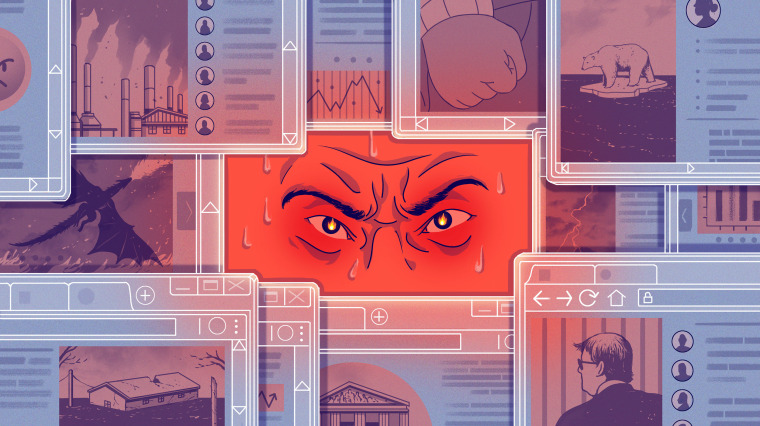Bored at work, you go to Facebook and scroll through until you find an article, posted by a friend, about a city official caught stealing from the city. As you read, you find yourself getting angrier and angrier until you suddenly wonder, Why am I doing this?
Welcome to the wonderful world of rage reading, when you engage with other people’s posts and updates — or the news — primarily to get yourself angry. It is not like when you get upset at posts that someone wrote to provoke or attack you personally; it’s strictly when you aren’t personally involved in the matter but choose to take an interest.
But why would you? What could be the attraction to those messages that get you worked up and annoyed? Is there anything in this anger that might be helpful and maybe even pleasant?
The simplest explanation is that, when you are bored or seek distraction, you want a little excitement. Going to a social media site where you reliably find things that upset you can help you manage your moods. It may seem counterintuitive but, to many of us, mild anger about others is better than boredom or ruminating about your own problems.
Another perspective draws on social comparison theory, which argues that people find out how well they are doing in terms of skills, opinions and social popularity by comparing themselves with others. A particular scenario is called downward comparison — when you choose to compare yourself with someone who is doing worse than yourself. You might choose to read about a situation where someone treated another person poorly, which makes you feel angry. But it also makes you feel like you are a better person than that jerk. (Aren’t you?)
On social media, you have abundant choices of people to compare yourself with. What makes these comparisons informative and emotionally moving is the fact that your contacts will often be similar to you in terms of hometown, age, ethnicity and so on. But in some ways your contacts are going to be doing worse — they mess up, offend people, take advantage of others and let other people down. You probably have a sense of where you can reliably find updates on those kinds of instances; we all know where to look for jerks and unreasonable people.
SIGN UP FOR THE THINK WEEKLY NEWSLETTER HERE
And when you do read about these instances, it just reminds you how wonderful and worthy you are yourself. Even though you haven’t accomplished anything grand lately, it helps to remember that there are many awful people out there, but you aren’t one of them. Through your everyday kindnesses and level-headedness, you are being a better person compared to those jerks out there.
But getting angry can do more than just make you feel better about yourself in comparison to others. It can motivate you to take action to address injustice, or simply to be more kind and do the right thing in your own life. Anger as an emotion is a powerful signal to your organism to take action. Even if you can’t do something specific in every case, maybe you can at least express support to those who were victimized by the act that angered you. Showing social support can definitely help to make things right again. And when you seek out that anger by reading up on social media, you are doing what has been labeled “mood adjustment” — inducing particular moods in oneself through media use to facilitate anticipated actions.
Moreover, the actions can lead to social change — another potential reason that you might seek to anger yourself by reading flabbergasting social media posts. It’s not just about you as an individual; it could also be about your social group.
We all think of ourselves in social terms — for example, as an American, a Democrat, a Christian, etc. — and we feel more connected to people with whom we share a certain identity, known as our in-group. And, on the other hand, we might distance ourselves from people who are not in our in-group and whom we perceive to be different from us.
Let’s say that you’re reading about a crime committed by an outgroup person, which you might find appalling. For instance, if you’re an employee and read about a corporate boss committing tax fraud, you would likely feel anger about the crime and maybe satisfaction about any punishment. But, if you are reading about an employee committing tax fraud, you might think that it’s unfortunate that the person got caught. Your emotional responses will depend on how you relate to the people involved: Observing wrongdoing instigates anger if you feel detached from the person, but could induce sympathy if you feel connected to him or her.
In that way, angry reactions to social media posts help to maintain our social identity — how we define and think of ourselves. It might even facilitate bonding with other people in our in-group, if the angry reaction is shared with others.
Social identity theory was developed to explain these kind of intergroup tensions, as different social groups in a society will often compete for resources and influence. If, for example, women as a social group bond through angry reactions on social media, they can drive social change against sexual harassment, as the #MeToo movement illustrated. If consumers bond through angry reactions against ruthless, environmentally careless manufacturing, they can alter business practices. Anger can be a great thing.
Whether we read things that anger us on social media or on other, traditional outlets might not matter all that much for the fundamental motivations. However, online and social media certainly provide more and easier choices of things to read, which can facilitate the process. And they certainly help in finding and connecting with like-minded others who share your anger — which is pivotal to starting social change and making the most of anger.


